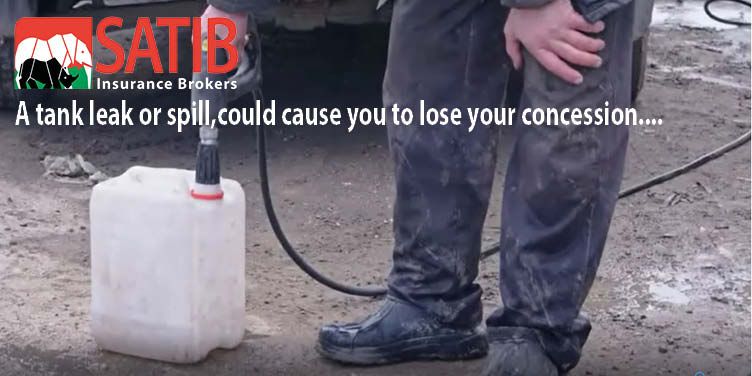The phrase “Insurance is a grudge purchase” is somewhat of a cliché. There are various insurance products out there, and they all get tarred with the same brush. Sadly, insurance CAN NOT be ignored. Some may be lucky enough to get away without insurance, but I have not met that person yet. You simply have no idea what life has in store for you, no matter how well you plan or are prepared.
If you find yourself surprised to be mulling over this article, you may just find it is a ‘nudge message’ specifically for you, to head the following advice.
Given the fact that our expertise lies in the Tourism, Hospitality and Leisure Industry, I’m going to highlight an example, which many suppliers in the industry will be able to identify with. Namely, fuel storage tanks for vehicles.
Environmental Cover is one insurance product we strongly suggest you invest in, as you could be held accountable personally as many liability policies don’t cover it.
With many lodges and camps located in eco-sensitive areas, should their tanks leak or spill, and they do not clear and clean up comprehensively and compliantly, they could, at the very least, lose their concession.
Strangely enough, Environmental Cover is not a requirement by law unless specifically requested by a government department in terms of licensing. However, should the environment become polluted, the guilty party will be held responsible for the clean-up and remediation under the National Environmental Management Act (NEMA).
Section 28 of the NEMA deals with the environmental responsibilities of a company, whilst Section 30 details what needs to be done in the event of an incident.
Should a company have an environmental incident they will be required to rehabilitate the site to the satisfaction of the Department of Environmental Affairs (DEA) or they will be liable to fines/ penalties and possibly prosecution. This is a very costly process.
Incidents at fuel depots often occur during loading and offloading, whilst we have also seen incidents caused by other factors such as trucks driving into tanks, fires, lightning strikes and burst pipework (both above and below ground).
- An Environmental Impact Assessment (EIA) is to be undertaken before installation of these tanks
- Companies with storage tanks need to be aware of the laws and Acts
- Ignorance of the law is not an excuse
- Environmental Management Plans need to be in place
- Above ground tanks need to be bunded (constructed retaining wall around storage)
- On-Site Environmental Impairment (OSEI) insurance provides coverage for environmental incidents that emanate from storage of fuels
- OSEI insurance will cover against pollution risks from storage tanks
Did you know
- The Department of Environmental Affairs may fine up to R10 million and/or 10 years in jail for non-compliance following an environmental spillage incident. NERSA can fine up to R2-million per day.



